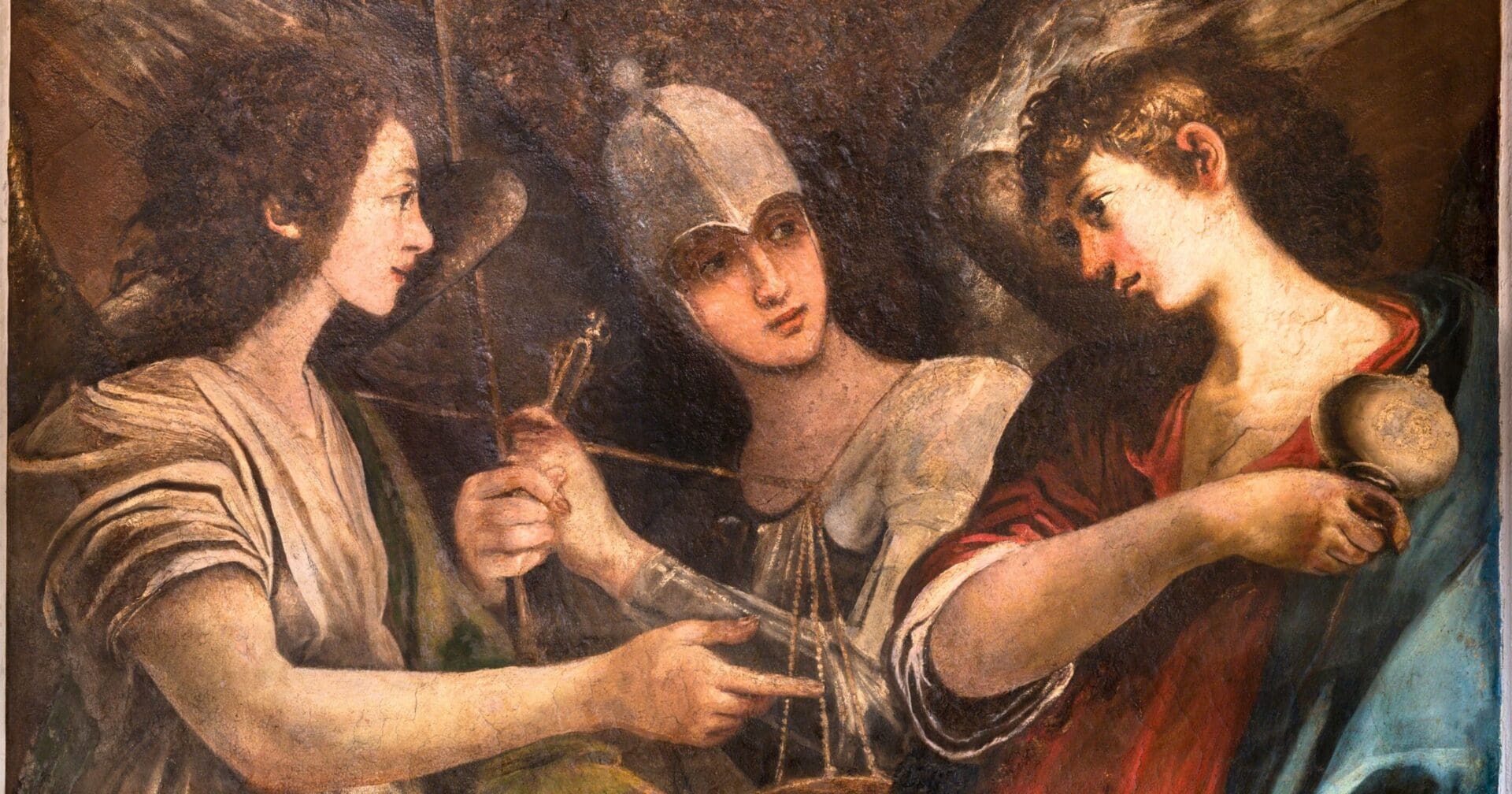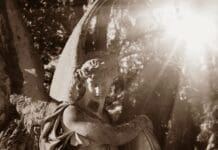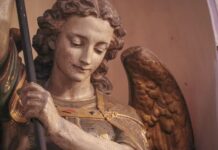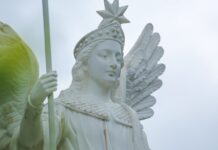Michael (Who Is Like To God?)
Michael, whose name translates to “Who is like to God?”, is known as a warrior in the celestial realm. He is a defender against evil forces and a protector of the faithful. He is recognized in Scripture on four occasions:
In Daniel 10:13, where he assists Gabriel.
Daniel 12, marking his role in the end times.
The Epistle of St. Jude, revealing his dispute with the devil over Moses’ body.
In Revelation 12:7, highlighting his leadership in the battle against the dragon.
Christian tradition ascribes to Michael four key roles: battling Satan, saving souls from evil especially at death, being the champion for both Jews and Christians, and ushering souls to judgment. While his celestial rank varies among interpretations, many believe he’s the prince of all angels.
Michael’s imagery in art often depicts him as a warrior defeating a dragon, symbolizing Satan. He sometimes holds scales or the book of life, underlining his role in judgment.
Gabriel (The Power of God)
Gabriel is notably known as the angel of the Incarnation and Consolation. He is depicted in the Bible four times:
Daniel 8, interpreting Daniel’s vision.
Daniel 9, communicating the prophecy of the “seventy weeks.”
Foretelling the birth of John the Baptist to Zachary in Luke 1 v8ff.
Announcing the birth of Jesus to Mary in Luke 1:26.
Though Gabriel’s name appears only twice in the New Testament, tradition often attributes to him other biblical appearances, like the angel who strengthened Jesus in the garden. Though commonly referred to as an archangel, there are interpretations based on his and Raphael’s declarations that they might hold a higher celestial rank.
Raphael (God has healed)
Raphael is prominently featured in the Book of Tobias from the Septuagint, where he accompanies young Tobias on an adventure, eventually revealing himself as an archangel. His main roles include offering prayers to the Lord on behalf of humans and healing.
Though only Michael and Gabriel are named in the New Testament, many believe Raphael is the “angel of the Lord” from John 5, who stirs healing waters at Bethzatha.
The three archangels, each with distinct roles, feature prominently in Christian teachings and traditions, emphasizing protection, communication, and healing. They’ve inspired countless interpretations and remain significant in faith practices today.


















Thank you for helping readers better understand the meanings of the names given to the archangels at this special time of remembrance.
A highly organized and detail oriented Remote Data Entry Assistant is needed at our company to work with our team of professionals to collect. analyze and input Data into our online systems and Social Media platforms. tz This is a remote position and full-time or Half-time job.
For Apply Click…….. Regular Payouts
Only last week, I was drawn (or led) to research of the Archangels through an Archbishop and a Pastor on facebook and their websites, while I was infact intending on sharing St.Michael”s prayer during a Paranormal Meet up held this previous week end, I was inspired to include far more information that I had stumbled upon. This lead me to include, The 9 Choirs of Angels,Archangels, Guardian Angels etc.. In particular these 3 Archangels, St Gabriel, St Raphael and mostly my talk was of St. Michael being our protector against evil and evil doings. Whilst sharing his protection prayer with others, I also wished to provide detailed information for those who may not be aware of the Angels in history. Doing research I also learnt the date St. Michaels Feast Day
As it turned out, time ran short on the night of the Meet Up and my talk has been delayed until next months Meet Up, although it may be a Blessing in disguise because now I have even more information that I can add and share with other team members and the public.Thank you so much, I always thoroughly enjoy the Readings and Scriptures and Prayers through facebook and this site. Bless you <3 xo
God, thank you for this website.
i thank the ALMIGHTY GOD for directing me to this page.and my fervent pray is that the same lord should direct others who are hungry and burning to know more about the truth.May his name be praised now and for ever more.Amen.
[…] https://ucatholic.com/saints/the-archangels/ http://www.americancatholic.org/Features/Saints/saint.aspx?id=1153&calendar=1 http://thecatholiccatalogue.com/feast-of-the-archangels/ http://www.catholicculture.org/culture/liturgicalyear/calendar/day.cfm?date=2014-09-29 […]
[…] HERE for a great breakdown of these most beloved saints. […]
[…] uCatholic […]
[…] uCatholic […]
A highly organized and detail oriented Remote Data Entry Assistant is needed at our company to work with our team of professionals to collect. analyze and input Data into our online systems and Social Media platforms. tx This is a remote position and full-time or Half-time job.
For Apply Click…….. Regular Payouts
[…] uCatholic […]
Currently laughing so hard I’m crying because all I can think of is Supernatural right now. Dead.
What happened to St. Urial????
[…] post St. Michael, St. Gabriel, & St. Raphael – The Archangels appeared first on […]
St.Michael, St. Gabriel, & St. Raphael – The Archangels, pray for us!
The archangels please pray for us and guide us against the snares of the evil ones Amen
Start with cleaning out the evil devil within the RCC hierarchical church
Angels are GLORIOUS.
Heavenly King, You have given us archangels
to assist us during our pilgrimage on earth.
Saint Michael is our protector;
I ask him to come to my aid,
fight for all my loved ones,
and protect us from danger.
Saint Gabriel is a messenger of the Good News;
I ask him to help me
clearly hear Your voice
and to teach me the truth.
Saint Raphael is the healing angel;
I ask him to take my need for healing
and that of everyone I know,
lift it up to Your throne of grace
and deliver back to us the gift of recovery.
Help us, O Lord,
to realize more fully the reality of the archangels
and their desire to serve us.
Holy angels,
pray for us.
Amen.
Saints Michael, Gabriel, Raphael, plus the other four Archangels, communicate to us the protection and power and healing of God the Father Almighty through Christ Crucified. Reveal truth and justice through charity to all unbelievers for the conversion of sinners and the salvation of souls. Amen.
A highly organized and detail oriented Remote Data Entry Assistant is needed at our company to work with our team of professionals to collect. analyze and input Data into our online systems and Social Media platforms. tc This is a remote position and full-time or Half-time job.
For Apply Click…….. Regular Payouts